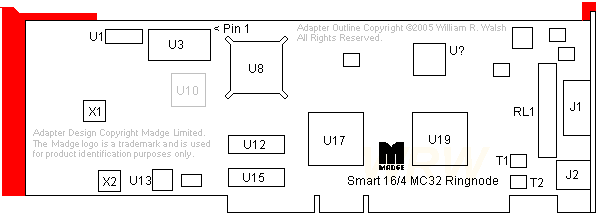|
Madge Smart Ringnode MC32
@0074.ADF - Madge Smart 16/4 MC32 Ringnode Version:
1.01
Madge Smart 16/4 MC32 Ringnode
(Image and text from William R. Walsh)

J1 - DB9 token ring connector
J2 - RJ45 token ring connector
RL1 - Omron GBA-434P-ST20-US
T1 - NPI 5712-10
T2 - NPI 5282
U1 - PAL "143230"
U3 - Smartrom Boot ROM socket
U8 - Texas Instruments TMS380C26PQL
U10 - Pads (for a PLCC boot ROM?) |
U12 - Hitachi HM538123AJ-8
U13 - Unknown 80A-5125
U15 - Hitachi HM538123AJ-8
U17 - NCR 86C05A (probably the MCA bus interface)
U19 - Madge 140-003 L
U? - TI TMS38054FNL
X1 - 64.0000 MHz
X2 - 40.0000 MHz |
Note: Some of the components vary between
the adapters that I have here. The most notable differences are at U12,
U15 and RL1. Some of my adapters have Aromat relays instead of Omron ones.
The RAM at U12 and U15 has a few different makers.
Various little unlabeled squares in the outline above are transformers
and similar parts.
My Thoughts:
This adapter seems to be on a par with the IBM LANstreamer.
Both adapters offer at least 40Mb/sec streaming (if your system supports
it) and busmastering technology. However, the Smart Ringnode does have
some advantages that make it better in some environments. More OSes have
built in drivers and this adapter is known to work in lower end systems
where the IBM streamer offerings may not work. This adapter also isn't
affected by the nasty Windows NT bug that prevents IBM Streamer family
adapters from working until an NT service pack is applied to fix the problem.
Also supported (if you use it) is auto-detection of ring speed. You
can also manually force the adapter to a given ring speed.
For me, these Smart Ringnode adapters have also been much easier to
find than the IBM Streamer adapters. I have only a few Streamers, but at
least six Smart Ringnodes.
Oh, and the red plastic tabs sure do make for an adapter that gets your
attention...
ADF Sections AdapterId 0074h "Madge
16/4 MC32 Ringnode"
I/O Location & Interrupt Level
Up to eight MC Ringnodes may be installed. Each Ringnode
must use a different I/O Location. It is recommended that each adapter
also uses a different Interrupt Level, although it is allowable for adapters
to share an Interrupt Level if necessary.
<I/O 0A20-0A3F,
Interrupt 3>, I/O 0A20-0A3F, Interrupt 10, I/O 0A20-0A3F, Interrupt
2, I/O 1A20-1A3F, Interrupt 10, I/O 1A20-1A3F, Interrupt 2, I/O 1A20-1A3F,
Interrupt 3, I/O 2A20-2A3F, Interrupt 2, I/O 2A20-2A3F, Interrupt 3, I/O
2A20-2A3F, Interrupt 10, I/O 3A20-3A3F, Interrupt 3, I/O 3A20-3A3F, Interrupt
10, I/O 3A20-3A3F, Interrupt 2, I/O 0E20-0E3F, Interrupt 10, I/O 0E20-0E3F,
Interrupt 2, I/O 0E20-0E3F, Interrupt 3, I/O 1E20-1E3F, Interrupt 2, I/O
1E20-1E3F, Interrupt 3, I/O 1E20-1E3F, Interrupt 10, I/O 2E20-2E3F, Interrupt
3, I/O 2E20-2E3F, Interrupt 10, I/O 2E20-2E3F, Interrupt 2, I/O 3E20-3E3F,
Interrupt 10, I/O 3E20-3E3F, Interrupt 2, I/O 3E20-3E3F, Interrupt 3
Arbitration Level
The Arbitration Level need only be changed if it is in
conflict with another adapter.
<Level 8>,
Level 9, Level 10, Level 11, Level 12, Level 13, Level 14, Level 5, Level
6, Level 7, Disabled
Transfer Mode
Streaming Enabled permits host bus data transfer rates
up to 40 MBytes/s in machines which support
this option. Streaming Disabled permits host bus data transfer rates up
to 20 MBytes/s.
With Fair mode selected, the MC Ringnode enters an
inactive state when it releases the bus. The system can service any
other arbitrating devices in order of priority before the Node requests
the bus again. In Unfair mode, the Node will immediately re-request the
bus after releasing it.
<Streaming Disabled (Fair)>,
Streaming Enabled (Fair), Streaming Disabled (Unfair), Streaming Enabled
(Unfair)
ROM Size & Location
If you have an option ROM installed, set this in accordance with
the instructions provided with it.
<Disabled/Not installed>,
8K, C4000-C5FFF, 8K, C6000-C7FFF, 8K, CC000-CDFFF, 8K, CE000-CFFFF, 8K,
D4000-D5FFF, 8K, D6000-D7FFF, 8K, DC000-DDFFF, 8K, DE000-DFFFF
Rem'd options: 32K, C0000-C7FFF,
32K, C8000-CFFFF, 32K, D0000-D7FFF, 32K, D8000-DFFFF, 16K, C4000-C7FFF,
16K, CC000-CFFFF, 16K, D4000-D7FFF, 16K, DC000-DFFFF
Ring Speed
You must use the same ring speed as the ring you are connecting
to. Incorrect ring operation will result from selecting the wrong ring
speed.
<Not selected>,
4 Mbit/s, 16 Mbit/s
Cable Type
Select the appropriate option according to the lobe cable
connector. Type 6 uses the 9-pin D-type (J1); type 3 uses the RJ45 phone-jack
(J2)
<DB9 connector, J1
(STP)>, RJ45 connector, J2
9595 Main Page
|
